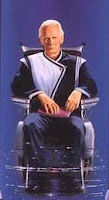

Some books feel like friends from the very beginning. Such is the case with Isaac Asimov's novel, Foundation. This book was originally the first in a series of Foundation novels. (However, Prelude to Foundation has since been published.) The novel is composed of five sections. Four of these sections were originally published separately and appeared as short stories in Astounding Magazine between 1942 and 1944. They were later compiled together into one volume in 1951 alongside a newly written introduction section, and thus Foundation as we know now it was published. (Does any of that matter? Not really. I didn't read the details on the publishing history until after I read it. But as an after note, I was intrigued by it. So I thought I'd share it with you.)
 For twelve thousand years the Galactic Empire had ruled supreme. Now it was dying. But only Hari Seldon, creator of the revolutionary science of psychohistory, could see into the future--a dark age of ignorance, barbarism, and warfare that would last thirty thousand years. To preserve knowledge and save mankind, Seldon gathered the best minds in the Empire--both scientists and scholars--and brought them to a bleak planet at the edge of the Galaxy to serve as a beacon of hope for future generations. He called his sanctuary the Foundation.
For twelve thousand years the Galactic Empire had ruled supreme. Now it was dying. But only Hari Seldon, creator of the revolutionary science of psychohistory, could see into the future--a dark age of ignorance, barbarism, and warfare that would last thirty thousand years. To preserve knowledge and save mankind, Seldon gathered the best minds in the Empire--both scientists and scholars--and brought them to a bleak planet at the edge of the Galaxy to serve as a beacon of hope for future generations. He called his sanctuary the Foundation.But soon the fledgling Foundation found itself at the mercy of corrupt warlords rising in the wake of the receding Empire. Mankind's last best hope was faced with an agonizing choice: Submit to the barbarians and be overrun--or fight them and be destroyed.
What can I say about Foundation without giving too much away? It is one of those rare books where it's best not to know. Best not to have preconceived notions of what it's all about. Best not to think too much about what it's saying and where it's going. It's best to just go along for the ride on this one.
The settings? Various planets. The characters? Too many to list. The plot? Complex but not difficult to follow. Each section of the book is separate from the whole. Most are divided by time. Between sections, thirty years, eighty years, fifty years, a hundred years could have passed. The reader picks up hints here and there about how much time has gone by. But this isn't a book where you follow characters around. This is more of a novel where ideas play the leading role.
If there is a cohesive theme to the novel it is manipulation. Whether passive or aggressive, Foundation is all about power struggles, manipulations, and getting others to do what you want when you want. It is all about ambition.
Do not look at this chart unless you want to confuse yourself. (Or you've read a good many of the books already.) For plot summary of the first novel, click here. For more information on the series as a whole, click here.

7 comments:
This is one of my favorite books - I read it when I was in high school, and I am so glad I knew nothing about it beforehand! It sparked my lifelong love of SF.
This was one of the first sci-fi books I read too. Your reviews are making me want to revisit some Asimov!
This was one of my favorites in high school, too. You've wriiten a great review, and make me willing to revisit Asimov.
I read this series years ago in exchange for having one of my male counter-parts read Gone With the Wind. I didn't expect to like this science fiction trilogy but found myself LOVING it! You are right in that its better not to really know what you are getting into when you first pick up the book. Just go along for the ride!
Great review, thanks!
Thanks for this reminder of a series that I LOVED when I was in school. This was one of my favorite series. I'll have to look them up and reread them. I'll be my son would like them, too!
I'm in 5th grade and my dad recommended this book for my sci-fi book report.This book was interesting.It had a lot of words I did not know.Thanks to my dad he introduced me to Asimov.I would recommend it to anyone who likes science and futuristic gadgets.
I liked the complexity of the story, and that it is so ambitious in its time frame, as it takes in over long periods of time, with its rare events.
It’s a great book, and one that has to be read by science fiction followers.
Post a Comment